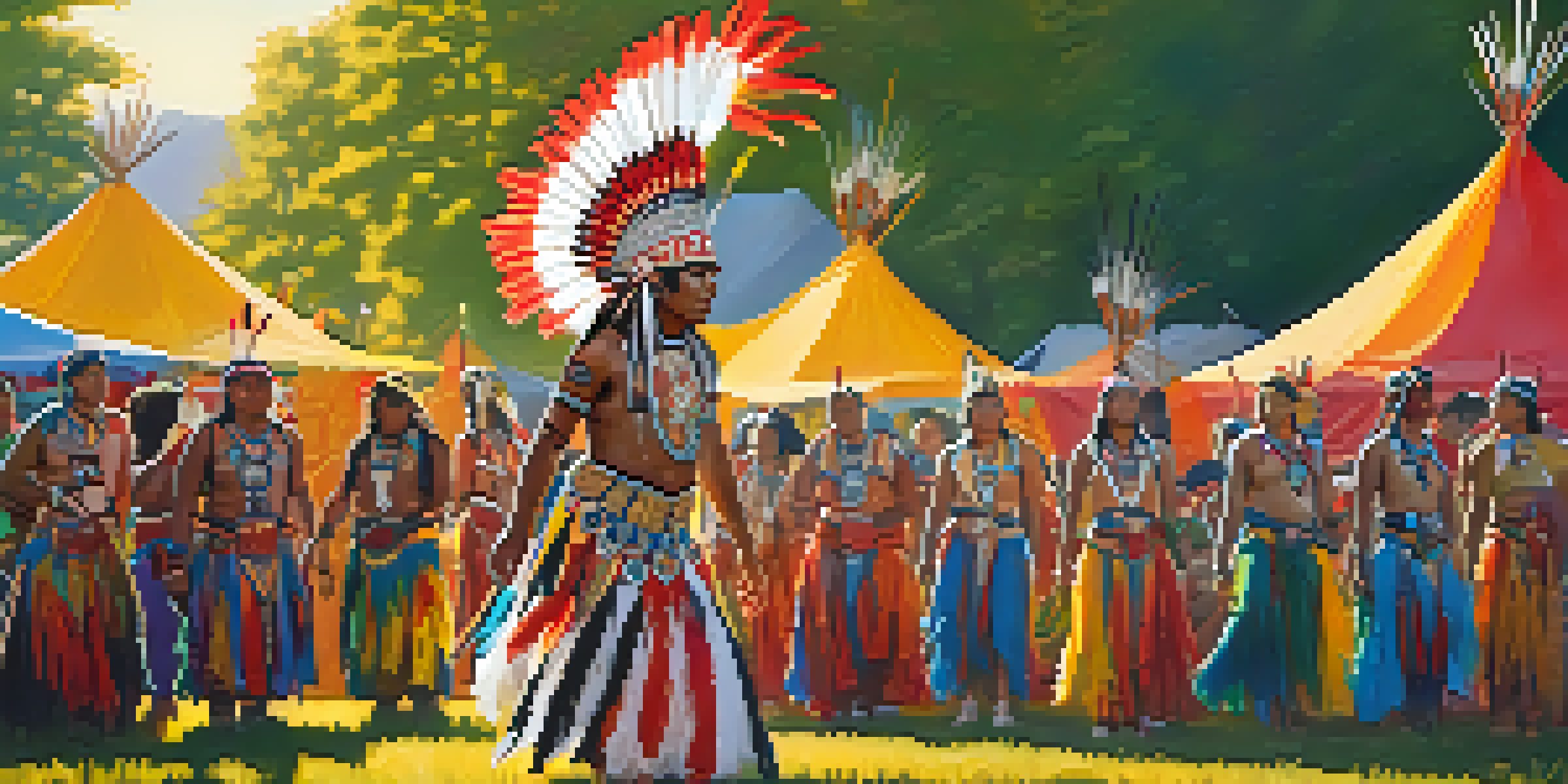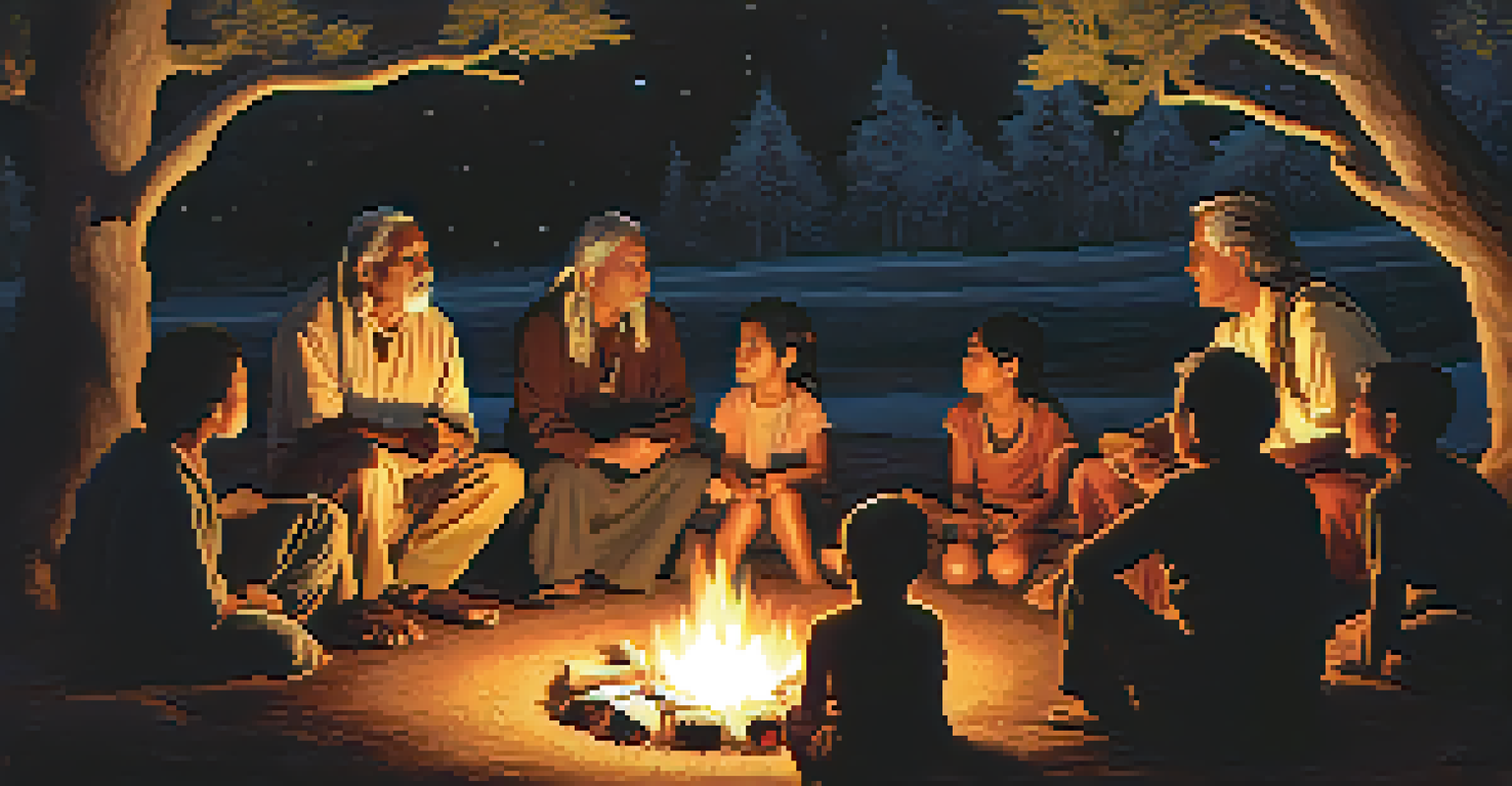Sacramento's Indigenous Communities: A Legacy of Resilience

Understanding Sacramento's Indigenous Heritage
Sacramento's history is deeply intertwined with its Indigenous communities, primarily the Nisenan, Miwok, and Wintu tribes. These groups have lived in the region for thousands of years, developing rich cultures and traditions that are still evident today. Their connection to the land is profound, as they have cultivated and managed it sustainably long before settlers arrived.
Indigenous peoples have an intrinsic connection to their land, which is reflected in their culture and traditions.
The Indigenous peoples of Sacramento have passed down their stories and practices through generations, creating a legacy that defines the region's identity. Their languages, art, and traditions reflect a close relationship with nature, emphasizing respect and stewardship. This heritage is not just a relic of the past; it continues to influence contemporary culture and community life.
As we explore this history, it's important to recognize the ongoing contributions of Indigenous communities to Sacramento's diverse tapestry. Their resilience in the face of adversity has forged a path for cultural revival and greater awareness among the broader population. Understanding this heritage helps us appreciate the depth of Sacramento's cultural landscape.
The Impact of Colonialism on Indigenous Peoples
The arrival of European settlers marked a tumultuous period for Sacramento's Indigenous communities. Colonization brought disease, displacement, and disruption of traditional ways of life, which had devastating effects on the population and their social structures. The loss of land and resources forced many tribes to adapt in ways that threatened their cultural practices.

Despite these challenges, Indigenous peoples demonstrated incredible resilience. Many communities worked to preserve their traditions, languages, and identities, often adapting their practices to new realities. This resilience is evident in the continued existence of tribal governments and the revitalization of cultural events, which foster a sense of community and belonging.
Indigenous Heritage Shapes Sacramento
Sacramento's rich cultural identity is deeply rooted in the traditions and histories of its Indigenous communities, including the Nisenan, Miwok, and Wintu tribes.
Today, the story of survival and adaptation continues as Indigenous leaders advocate for recognition, rights, and restoration of ancestral lands. Understanding the impact of colonialism is crucial for acknowledging the struggles faced by these communities and supporting their ongoing fight for justice and equity.
Cultural Revitalization Efforts in Sacramento
In recent years, there has been a significant resurgence of interest in Indigenous culture within Sacramento. Community members are actively reclaiming their heritage by revitalizing traditional practices, languages, and ceremonies. Events such as powwows and cultural festivals celebrate these rich traditions, bringing together Indigenous and non-Indigenous people alike.
Understanding the history of Indigenous peoples is vital to fostering respect and appreciation for their contributions to our society.
Educational initiatives have also played a crucial role in cultural revitalization. Local schools and organizations are increasingly incorporating Indigenous history and perspectives into their curricula, fostering greater understanding and respect. This education is vital for bridging gaps between communities and promoting a shared appreciation for the region's diverse history.
Furthermore, local Indigenous artists and storytellers are gaining recognition, using their platforms to share their narratives and perspectives. This creative expression not only preserves their culture but also enriches Sacramento's artistic landscape. Through these efforts, the legacy of resilience and strength within Indigenous communities continues to thrive.
The Role of Indigenous Leadership Today
Indigenous leadership plays a pivotal role in advocating for the rights and needs of their communities in Sacramento. Tribal leaders are at the forefront of initiatives aimed at improving social, economic, and environmental conditions. Their voices are crucial in discussions about land rights, resource management, and cultural preservation.
Moreover, Indigenous leadership extends beyond formal positions; it encompasses community members who actively engage in grassroots movements. These individuals often work collaboratively with local governments and organizations to ensure that Indigenous perspectives are included in decision-making processes. Their grassroots efforts highlight the power of community engagement in effecting tangible change.
Resilience Amid Colonial Challenges
Despite the devastating impacts of colonialism, Indigenous peoples in Sacramento have shown remarkable resilience by preserving their cultural practices and advocating for their rights.
Today, we see a growing recognition of Indigenous rights at local, state, and national levels. This momentum is driven by the tireless work of leaders and advocates who strive for justice, equality, and the preservation of their cultural heritage. Their efforts inspire future generations to continue the legacy of resilience that defines Sacramento's Indigenous communities.
Challenges Facing Indigenous Communities
Despite the progress made, Sacramento's Indigenous communities continue to face significant challenges. Issues such as poverty, health disparities, and limited access to education disproportionately affect these populations. These systemic barriers can hinder the ability of Indigenous peoples to thrive and fully participate in society.
Additionally, the ongoing threat of climate change poses risks to traditional ways of life. As natural resources become scarcer and environmental conditions shift, many Indigenous communities find themselves grappling with the implications of these changes. This situation underscores the importance of recognizing Indigenous knowledge systems in environmental stewardship.
Advocacy for policy changes and greater investment in Indigenous-led initiatives is essential to address these challenges. By amplifying their voices and supporting their efforts, we can contribute to a more equitable future for Sacramento's Indigenous communities. Together, we can work towards solutions that honor their resilience and heritage.
Educational Initiatives Promoting Awareness
Education plays a crucial role in fostering awareness and understanding of Indigenous issues in Sacramento. Schools and educational institutions are increasingly recognizing the importance of incorporating Indigenous perspectives into their curricula. This shift is essential for fostering a sense of respect and appreciation for the rich cultural heritage of the area's Indigenous peoples.
Programs that focus on Indigenous history, culture, and contemporary issues empower students to engage with these topics meaningfully. By learning about the challenges and triumphs of Indigenous communities, students can develop a deeper understanding of their place in the broader social context. This awareness is vital for promoting empathy and social responsibility.
Cultural Revitalization through Events
Community-driven events and educational initiatives are crucial for celebrating Indigenous culture and promoting awareness among both Indigenous and non-Indigenous populations in Sacramento.
Additionally, partnerships between Indigenous communities and educational institutions can enhance cultural exchange. These collaborations can lead to workshops, presentations, and events that showcase Indigenous knowledge and traditions. By creating spaces for dialogue, we can cultivate a more inclusive and informed community that values diversity.
Celebrating Indigenous Culture through Events
Cultural events play an essential role in celebrating and preserving Indigenous heritage in Sacramento. Powwows, art exhibitions, and storytelling festivals not only showcase traditional practices but also foster community connections. These gatherings provide an opportunity for both Indigenous and non-Indigenous people to come together, share experiences, and learn from one another.
These events are often filled with vibrant displays of art, dance, music, and food, reflecting the diverse cultures of Sacramento's Indigenous peoples. Attendees can immerse themselves in the rich traditions and contemporary expressions of Indigenous identity, creating a greater appreciation for their contributions to society. Such celebrations also reaffirm the resilience and strength of Indigenous communities.

By participating in these cultural events, individuals can actively support Indigenous artists, leaders, and community members. This engagement is crucial for promoting inclusivity and understanding within Sacramento. It allows for the sharing of stories that highlight the ongoing legacy of resilience and the importance of honoring Indigenous cultures.